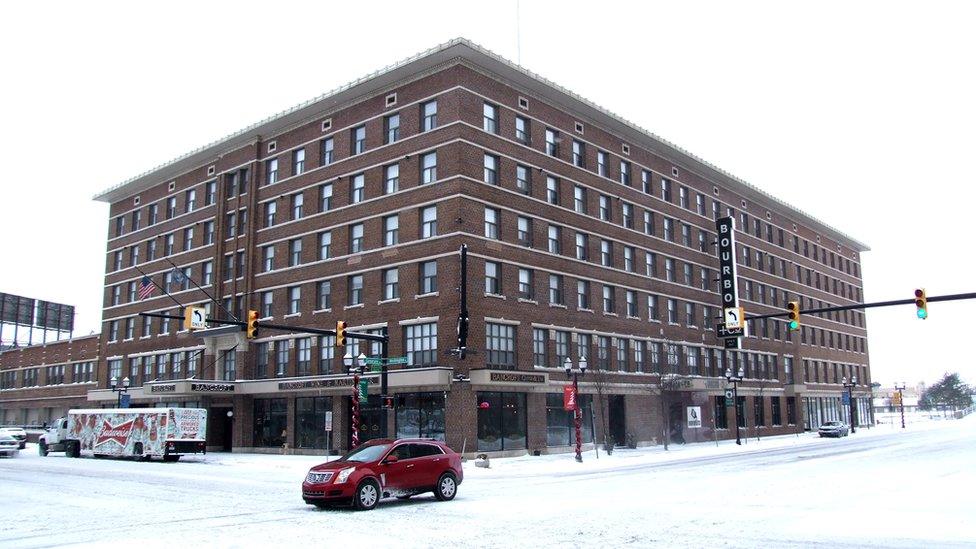Turning Point USA: Are conservatives fighting back on campus?
- Published
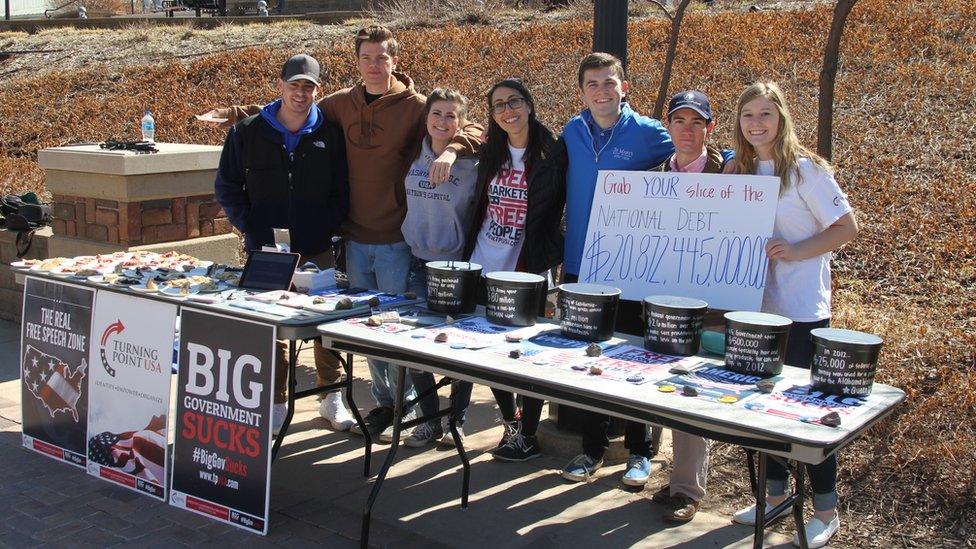
Turning Point members at their table session
A conservative group for US students, formed less than six years ago, has 1,200 branches and a $10m budget. So who are they?
On a sunny day in middle America, a line of students with Colgate smiles stand behind a table of apple pie.
In front of them, passers-by throw balls into buckets. If the ball goes in, they take a slice.
The students are here to sell. But they're not selling a product, or event, or even a pie. They're selling a message.
"The US army purchased a mega blimp for $297m - but never even used it!" says one bucket.
"The federal government is spending $2.6m over five years...to make sure prostitutes in China drink less on the job!" claims another.
Under the buckets, a poster sums up their message in three words: "Big government sucks."
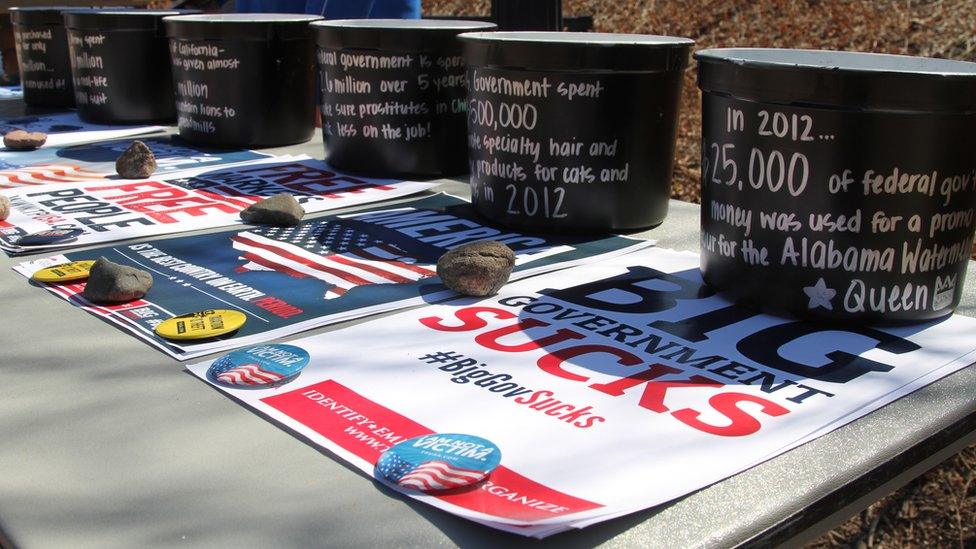
Leaders such as Malia receive training from Turning Point HQ; last July, a four-day Chapter Leadership Summit took place in Chicago
Welcome to Creighton University in Omaha, Nebraska, and the campus chapter of Turning Point USA.
Officially, the non-profit group promotes "freedom, free markets, and limited government". Unofficially, it wants to blow the dust off conservatism.
Turning Point pre-dates Donald Trump's presidency - it was formed in 2012 - and is non-partisan. They support conservatism, rather than the Republican Party.
Some of the Creighton chapter - including the founder - didn't vote for Mr Trump, and the treasurer is a Democrat. But nationally, there are links between Turning Point and the president.
Donald Trump Jr is friends with the group's founder, Charlie Kirk, and spoke at a Turning Point event in Florida, external in December. Soon afterwards, the president thanked Mr Kirk in a tweet., external
There are also shades of Mr Trump in the group's messaging. Big and bold. Short and simple. Uncomplicated and - above all - unapologetic.
In Omaha, a poster says: "I am not a victim". A sticker shouts: "Socialism sucks". This is active, go-get-em conservatism; proselytizing politics for the Instagram age.
The chapter's president, 21-year-old Malia Shirley, encourages her team to engage passers-by. Some take a sticker, or a piece of pie. Others take issue.
Shannon Chamling is a 19-year-old from southern California - "a very liberal area," she says - and wants to complain about a cake sale.
Last year, Malia and her team tried to organise an "affirmative action" cake sale on campus (affirmative action favours groups who have suffered discrimination; all-women shortlists are an example).
The cake sale idea came from Turning Point HQ's 51-page chapter handbook, external. The 2016 handbook recommends different prices for different races: "$2 for white...$.50 for black...free for Native American."
The point, says Turning Point, is to "demonstrate the unfairness and inadvertent racism of affirmative action". Malia decided to charge everyone the same, but include a card with every sale.
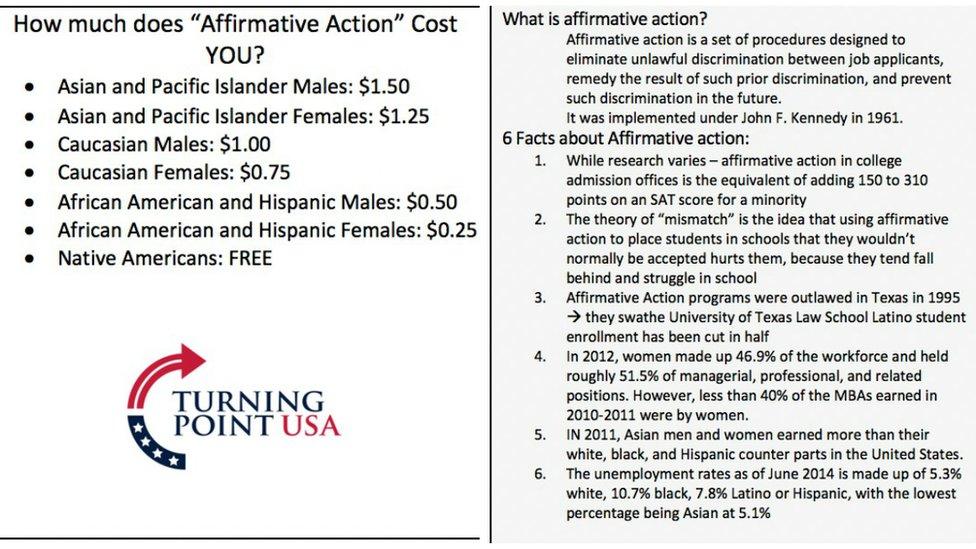
The card that would have been handed out at the cake sale
The university approved the event, but some students complained. It was divisive and racist, they said. It should be cancelled.
The protesters threatened to blockade the sale. In the campus newspaper, one student wrote, external that he "died just a little bit inside, knowing that Turning Point USA is allowed at Creighton".
The university called Malia. We are not telling you to stop, they said, but we are asking. Reluctantly, she cancelled. "I was extremely disappointed," says Malia.
Shannon, the student taking issue, thinks affirmative action is a good thing. "It helps people of colour and a lot of women, so I am in favour of that," she says.
Despite that, her 10-minute conversation with Turning Point is calm, considered, and respectful. They agree to disagree. She is glad they're on campus.
"Having both sides, and every viewpoint, is really important," she says. "Especially the way the last [presidential] election went - both sides screaming at each other, without very much listening."
Malia welcomes conversations with liberals like Shannon. It's one of the reasons Turning Point exists, she says. But, she adds, those conversations are rare.
"We want people to come up and talk about the ideas," she says. "If they disagree, totally fine. But that's never the case. They just want to shut us down, shut us down, shut us down."
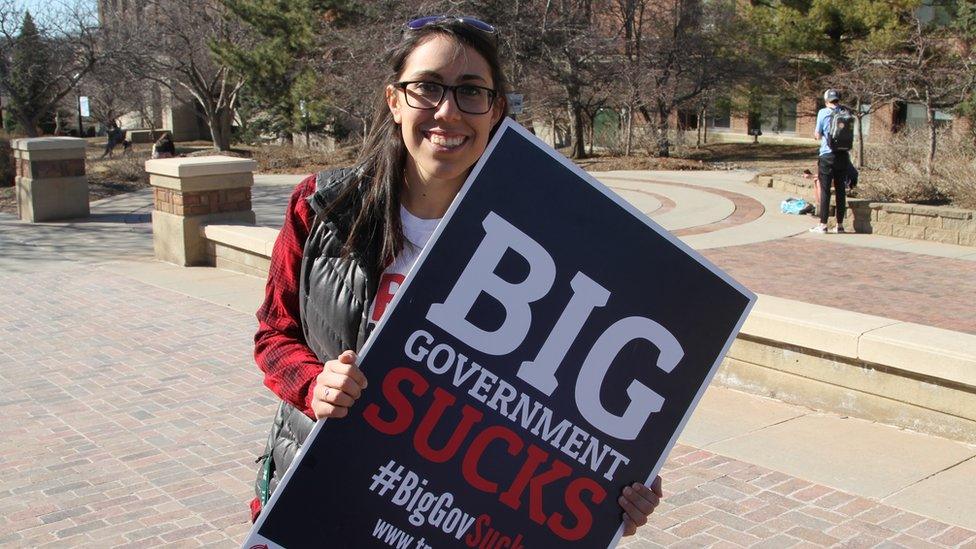
Malia describes herself as "conservatarian" - "not totally conservative, not totally libertarian"
A day after the pie event, the Creighton chapter hold their monthly meeting. Nineteen people turn up; seven are women. There's free pizza at the front.
Malia, wearing a Socialism Sucks t-shirt, begins with a clip from Fox News: Candace Owens, Turning Point's director of urban engagement, debating Jehmu Greene, a Democrat.
Members pitch for next month's leadership election, before debating that day's campus protest (around 200 staff and students joined a 17-minute walkout, calling for action after February's school shooting in Florida).
Some think the staff should have stayed - "We're paying them to be here," says one - while others think they had a right to protest. It's a good-natured debate. At Creighton, it seems, Turning Point is a broad church.
When asked what their political priority is, the answers vary: immigration; fiscal responsibility; free speech; law and order; anti-abortion; others.
When asked what media they use, there's also variety: New York Times; Breitbart; Buzzfeed; Daily Wire; Drudge Report; Ben Shapiro's podcast.
But, when asked if there's liberal bias on campus, the answer is unanimous. Yes, they say, there is - even at Creighton, a Catholic university with $38,000 annual tuition fees (£27,000).
Many have lost friends over their conservatism. Others feel essays are marked down for raising right-wing ideas. One student from Texas says a professor called Trump voters "uneducated rednecks": at the time, the student had a Trump sticker on her laptop.
The chapter's founder, Justin Carrizales, sits at the back, smiling. This is familiar ground. When he alleged liberal bias at Creighton, it made national news.
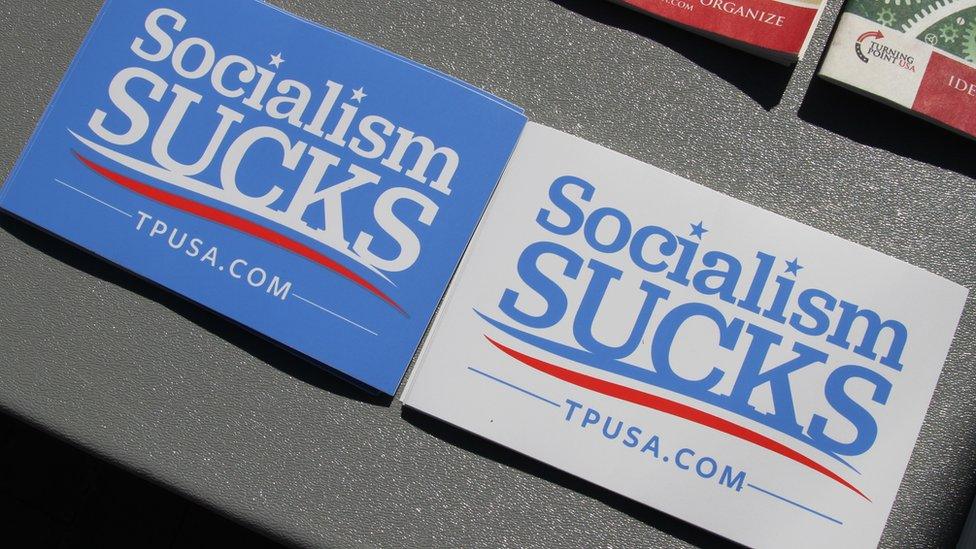
Turning Point stickers include "I love capitalism", "Guns save lives", and "You are entitled to nothing!"
Justin is a smiling 22-year-old from Chicago who speaks in rapid-fire sentences. He wears shorts and a National Rifle Association T-shirt; on the back, it says "Keep calm and carry guns".
He was raised in a Democratic family, with Democratic teachers and friends, but grew up more right-wing. At high school, he started calling himself conservative, and enjoyed challenging teachers in class.
"I would try to have a conversation with them - this is the other side - because we weren't getting that," he says.
When he went to college in 2014, a Turning Point member in Iowa - just across the Missouri river from Nebraska - asked if he would start a chapter at Creighton.
"I was like yes, absolutely, I'd love to," says Justin. He liked Turning Point's support for fiscal responsibility - the US public debt is over $20 trillion, external - and its non-partisan stance.
"It was always principles over people [candidates], and principle over party," he says. "I enjoy that so much more, because I consider myself a conservative before a Republican."
After proving interest in a Turning Point chapter, Justin went to the college for approval. They turned him down, saying he missed the deadline (he says they agreed to a late filing).
"But I was like, simple enough, I'll submit again," says Justin. And then came the multiple-choice Trump question.
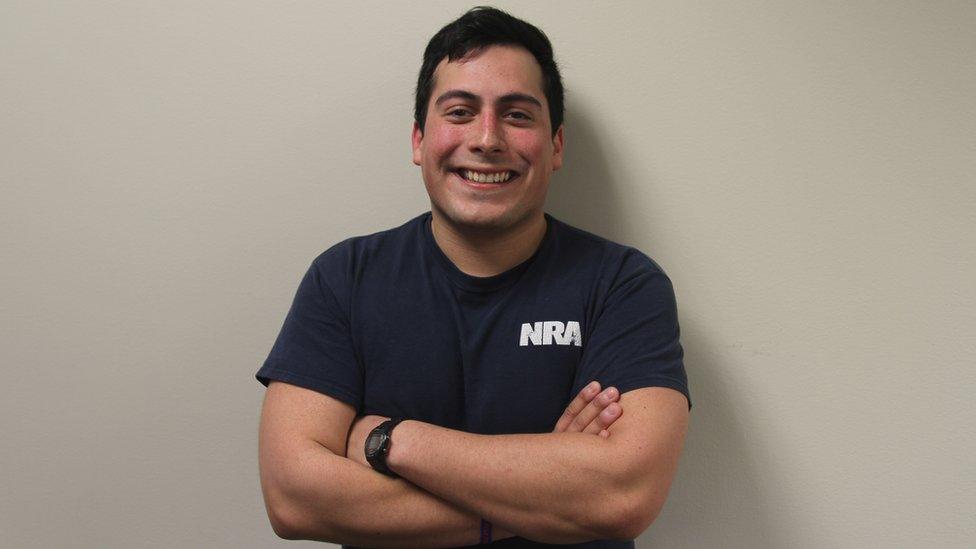
Justin Carrizales, founder of the Turning Point chapter at Creighton
In 2015, one of Justin's English professors included a bonus question on a test. It asked whether Donald Trump was a) a fool, b) already in hell, c) a clown, d) all of the above, e) an evil man, f) the anti-Christ.
Justin took a picture, and the story was picked up by media across the country. Creighton said the question was an attempt at humour and didn't represent the university's views, external.
Soon afterwards, Justin's second attempt to get Turning Point approved on campus was turned down.
"They rejected it outright," he says. "All of a sudden there was a target not only on my back, but the organisation's." (The university says it did not attempt to silence Turning Point).
Turning Point was finally approved at Creighton in 2017, and is free to host events. Even so, Justin says some conservatives don't feel comfortable on campus.
"I would hate to take away from the gay community, and the struggles they have, but I relate to it," he says.
"Students come up to me, or they message me. They're saying: 'Hey, I support you. Keep doing what you're doing. I would totally love to be involved, but I can't, because I'm scared, or I'm worried."
Scared of what?
"The most worrisome thing, which comes out again and again, is their worry about professors," says Justin.
"And they want to feel comfortable around friends. Anyone in this room could probably tell you - people look at you differently."
A BBC video from 2017 on campus conservatives
Turning Point was founded by an 18-year-old from the Chicago suburbs, Charlie Kirk, in 2012. Since then, it has attracted - or sought - controversy.
In November 2016, it published a list of teachers who, allegedly, discriminate against conservatives and push left-wing propaganda. It was called the Professor Watchlist. So far, 258 people are on it.
Critics call it sinister; McCarthyist, even. Turning Point calls it a "free speech response to radical leftist professors who are silencing opposing student viewpoints".
Either way, that muscular, chest-out conservatism has proved popular.
Turning Point has groups on more than 1,200 US campuses - high school and college - with 450 officially recognised by their school. Wealthy donors provide a $10m budget, external, and there are more than 100 staff.
In February, the Creighton chapter hosted a talk with Ben Shapiro - a 34-year-old conservative commentator and rock star of the right-wing. They expected to sell 400 tickets; they actually sold 2,000.
"After we announced we were bringing him in, I started getting emails, Facebook messages, DMs on Twitter," says Malia.
"People were saying, 'I'm so excited a conservative speaker is coming. I'm conservative but I never want to say it.' It shows that it [conservatism] is not unpopular - just quiet."
So is this a trend? Are we seeing the start of a conservative fight-back? At the very least, says Justin Carrizales, there is a push-back.
"Conservatives have been pushed around too much, to where they feel the need to push back, and there needs to be some sort of counter-culture," he says. So conservatism is the new counter-culture?
"Yeah! Which is kind of crazy, because liberals were at some point a counter-culture to a traditional, conservative country, right? Now, the conservatives are doing the exact same thing."

Statement in full from Creighton University:
"The Creighton University chapter of Turning Point USA met all the requirements of our Student Organization Review Committee in its most recent application to form a student organisation.
"Creighton University did not, at any time, attempt to silence Turning Point USA's opinions or right to form a chapter.
"We simply asked the group to follow the same regulations and submission guidelines as any other group, and the initial application contained insufficient information.
"In addition, the university provided support to TPUSA when Creighton students asked to use one of our facilities to host a lecture by Ben Shapiro, including moving the event to a larger venue."
- Published17 November 2017
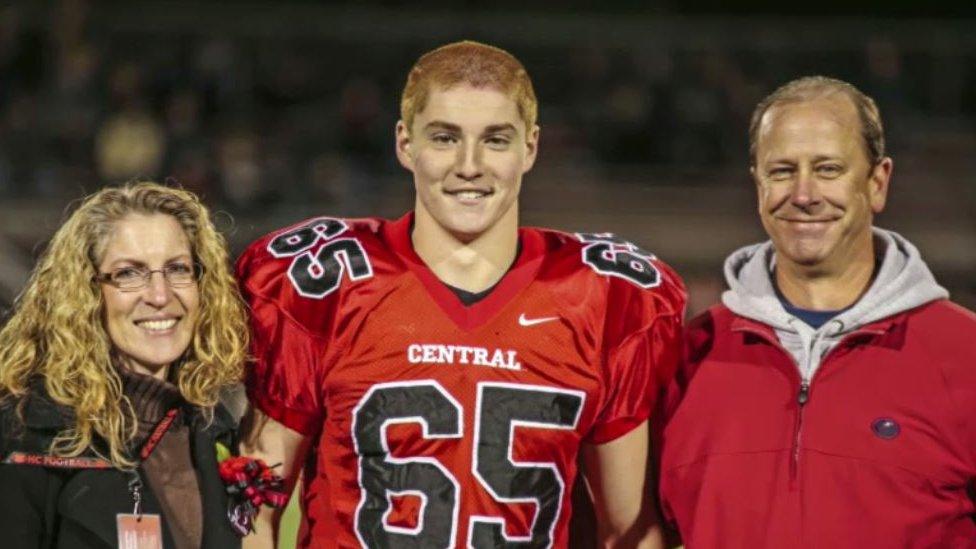
- Published29 January 2018
